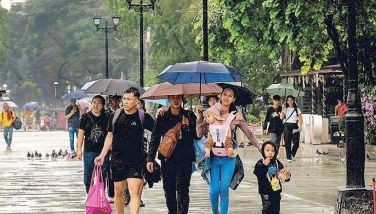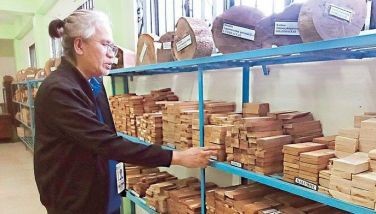DOJ faces dilemma in securing massacre witnesses
MANILA, Philippines - The Department of Justice (DOJ) admitted yesterday to facing a dilemma in securing witnesses in the case of the massacre of 57 people in Maguindanao on Nov. 23, 2009 after the recent discovery of the killing of another key prosecution witness.
Justice Secretary Leila de Lima said the hands of the DOJ and its prosecution team handling the multiple murder case before the Quezon City regional trial court (RTC) are tied in terms of ensuring the safety of at least 103 witnesses set to testify in the trial.
She said the killing of Esmail Amil Enog last March and of Suwaib Upham two years ago should not be attributed to the failure of government to secure the two, but rather to the lack of power of her department to compel them to submit to government security through the witness protection program (WPP). “These witnesses were not WPP-covered. As you know, WPP coverage is voluntary and never compulsory. We cannot compel witnesses who refuse to be covered (by the program” De Lima told The STAR.
The DOJ chief believes these two incidents were a testament to the need to amend the WPP law by Congress.
“There’s really a need to put more teeth to the WPP law. WPP officials have no controlling power over witnesses covered by the program, how much more on those who refuse to be covered?” she lamented.
De Lima said the proposed amendment remains pending although it has been marked as a priority. She called on Congress to expedite its passage.
Lawyer Martin Meez, WPP director, said another concern is their lack of resources and ample personnel.
He revealed that they have 514 witnesses on key cases today but only have less than 175 personnel.
He said they have been depending on augmentation from the police force in securing witnesses.
The DOJ officials issued the statement in reaction to concerns expressed by the family of victims and witnesses as well as international groups like the New York-based Human Rights Watch (HRW) over the killing of the two witnesses.
Authorities confirmed Enog’s killing only earlier this month.
It was learned that he was killed last March but his body was found in a sack near a marshland only last month – chain-sawed into pieces.
A self-confessed member of the Ampatuan clan’s private army who refused to be placed under government protection, Enog had testified in court in July last year that he drove dozens of gunmen to the massacre site from the residence of one of the suspects.
Upham, on the other hand, was gunned down in June 2010 after failing to receive the government protection he requested.
Prosecutors considered Upham a highly credible witness, being one of those who directly participated in the murders.
Another killing was presumed to be linked to the case.
Businessman Mohamadisa Simpal Sangki, 51, was stabbed and shot dead in Cotabato City in April 2010. Although he was not a witness, he was the uncle of Ampatuan Vice Mayor Rasul Sangki, one of the first witnesses to implicate prime suspect former Datu Unsay town mayor Andal Ampatuan Jr.
The HRW, in a recent statement, has called on the Philippine government to redouble its efforts to protect witnesses in the massacre case.
“As the reported killing of witness Esmail Amil Enog underscores, these witnesses are in extreme danger and it is appalling that they are being hunted down one after the other,” the group’s deputy Asia director Elaine Pearson said.
De Lima likewise defended the prosecution panel over what appears to be the slow pace of the trial.
“The slow pace of the trial is not the fault of the prosecution. There are just too many accused and witnesses, not to mention the countless and constant dilatory maneuvers of the defense,” she explained.
The DOJ chief also believes that the slow pace of the trial could be attributed to the “cautious” nature of QC RTC Branch 221 Judge Jocelyn Solis-Reyes. Relatives of victims of the massacre have expressed frustration over the slow trial, especially with the uncertainty on how long proceedings will last.
- Latest
- Trending































